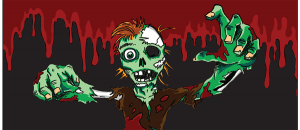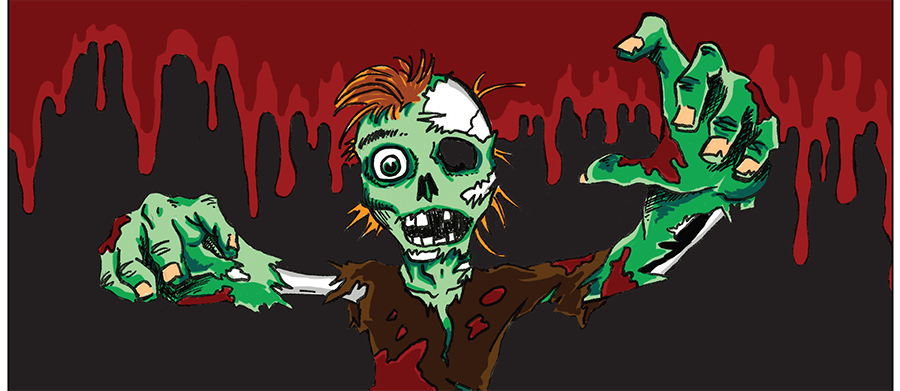By Karen Gavis/managing editor
 This summer, occurrences such as a naked man-eater in Florida, a San Antonio mother turned cannibal and reports of a Texas man gobbling a live canine caused Internet searches for “zombie apocalypse” to spike.
This summer, occurrences such as a naked man-eater in Florida, a San Antonio mother turned cannibal and reports of a Texas man gobbling a live canine caused Internet searches for “zombie apocalypse” to spike.
But what exactly are zombies? W ell, that depends upon whom you ask.
A bartender might describe a zombie as a mixture of rum and fruit juices.
To SE computer science associate professor Nosratallah Nezafati, in computer terms, a zombie means a PC that has been overtaken and manipulated by another source.
“If you got infected with a spam or any other methods and your PC is under the control of a botnet, now the PC is a ‘zombie,’ he said. “The term is appropriate as the computers do only what the controller tells them to do.”
A group of zombie computers are called a “zombie army,” Nezafati said. Still, for others, zombies symbolize mindless, soulless, undead creatures that lumber about while
hungering to feast upon the living.
To aid in preparation for a looming zombie invasion, several organizations stepped up. And according to Forbes, Hyundai has released the Elantra Coupe Zombie Survival Machine complete with a spiked zombie-plow on the front end.
There are architectural designs for zombie safe houses. And the Centers for Disease Control and Prevention as well as the Federal Emergency Management Agency offered readiness tips on their websites to help people prepare for an impending zombie apocalypse or other types of emergencies.
South student Jacob Teague agreed that if people were prepared for a zombie invasion, they would be prepared for anything. So, he took heed and prepared what he calls “bug-out bags” for his family, which include clothing, batteries and hygiene items, he said.
Teague said there are different kinds of zombies.
“Some are slow, like the ones that rise from the dead,” he said. “But others are fast-moving.”
Teague said he believes in the possibility of a future zombie invasion. However, it would be in the form of a virus that attacks human brains, and those would be the fast ones.
Others, including a few students he knew at NW Campus, share his beliefs, Teague said.
“They have zombie debates,” he said.
Teague said people have differing opinions about zombies. Some people actually want to be zombies, and there are also zombie hunters.
“I’m like a zombie survivalist,” he said.
Before coming to America, converting to Christianity and graduating from the University of North Texas, SE government associate professor Ehikioya Agboaye lived in Nigeria and was a voodoo practitioner.
“I could chew on a leaf and put it on the road, and if you step on it, you fall dead,” he said.
Agboaye said African zombies are not like the stereotypical zombies portrayed in America, but rather demonic spirits that masquerade as people who have died and return among the living to perform certain restricted activities and then go back.
“You have the power to conjure them,” he said.
In voodoo religion, Agboaye said people cannot go directly to the supreme God who is believed to be the creator of everything. They must first locate a witch doctor to summon ancestral spirits that can communicate with the supreme God.
“Most Africans are born into such families,” he said. “He [the witch doctor] has the power to channel ancestral spirits. Usually, they require blood.”
The greater the request, the larger the penalty of blood. People sometimes sacrifice roosters or goats, but the ultimate sacrifice is human, Agboaye said. And if organs are consumed, more power is gained.
Although he has never witnessed a zombie specifically, “I believe they [zombies] exist,” he said. “We are talking about people who have let their physical body become controlled by demons. They manipulate your body.”
Agboaye said coming under the control of a Bokor, or sorcerer, was a feared thing in Africa.
Although Agboaye thinks some of America’s recent flesh-eating actions may be linked to drug use, he said the real zombie of Africa is not drug-related but rather demonic activity. Agboaye said he believes such activity exists within the United States as well.
“America is not only comprised of people who go to church every Sunday,” he said.

